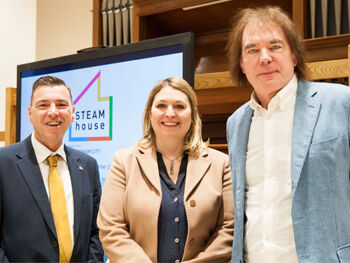University News Last updated 01 December 2017

The Rt Hon Karen Bradley MP, Secretary of State for Digital, Culture, Media and Sport has visited Birmingham City University to find out how the institution’s new creative innovation centre will support economic growth across the Midlands from next year.
The £3.5 million project known as STEAMhouse will include the refurbishment of a former car dealership in Birmingham’s Digbeth area to house the new centre and maker space. By connecting Arts into STEM subject areas (Science, Technology, Engineering and Maths), STEAMhouse will provide support to 200 sole traders, start-ups and local businesses with access to expertise and finance for growth.
It is a partnership arrangement with Birmingham arts organisation Eastside Projects that aims to bring Arts in line with STEM subjects, encouraging a closer way of working across disciplines and industry sectors.
Culture Secretary Karen Bradley said:
“It was fantastic to meet the brilliant team behind the STEAMhouse project and hear all about the exciting plans to create a world-leading innovation centre.
“I was particularly impressed by the collaborative spirit of the project, which will help boost skills in the fields of arts, science, technology, engineering and maths.
Government backing
The initiative will inform a later, second phase of the STEAMhouse project, which has already received£14 million from the Government in the 2016 Budget. It will see the development of incubation and office spaces, teaching facilities, co-working and maker spaces, and artists’ studios, and has the potential to create thousands of new jobs.
Due to open on Digbeth High Street in early 2018, STEAMhouse’s pilot phase will bring together academics, entrepreneurs, designers, makers, future talent and organisations to foster greater innovation, develop new products, and support economic growth with a programme of business support. It will house substantial new fabrication facilities with equipment and staffing to support production and making.
Professor Julian Beer, Deputy Vice-Chancellor, Birmingham City University, said:
“Our STEAMhouse project will optimise the potential to create new jobs, skills, knowledge and alliances between businesses, academics, artists and citizens like never before.
“We were delighted to have the opportunity to showcase this to the Secretary of State, explaining our fantastic free programme of support for businesses, including research collaborations with our academics, that will ensure every interaction is a success.”
Discussion
Alongside Professor Julian Beer, the Secretary of State also spoke with Joanna Birch, Director of Innovation, Enterprise and Employability at Birmingham City University; Dr Tom Cahill-Jones, Programme Leader for STEAMhouse; and Ash Vora, Head of Digital at South Doc Services and Managing Director at Substrakt Health.
Ash spoke about how his company is aiming to deliver innovative technology solutions that can pave the way for a more sustainable National Health Service, and discussed how STEAMhouse will help him achieve this.
Funded by the European Regional Development Fund and Arts Council England, STEAMhouse will drive innovation and research to create business solutions that fuel long-term economic growth.
STEAMhouse supports the growth sectors of health and life sciences, low carbon, creative and digital technologies and advanced manufacturing across the Greater Birmingham and Solihull Local Enterprise Partnership (GBSLEP) region, in turn, aiding the development of the Government’s Midlands Engine.
Royal Birmingham Conservatoire
The meeting was held on Thursday 30 November in the Organ Studio at Birmingham City University’s new Royal Birmingham Conservatoire. Prior to the meeting, the Secretary of State became the first Cabinet Minister to enjoy a tour of the music and acting academy, led by its Principal, Professor Julian Lloyd Webber.
The Royal Birmingham Conservatoire is a unique contemporary building, incorporating five public performance spaces including a new 500 seat concert hall for orchestral training and performance, a purpose-built organ studio and private rehearsal and practice rooms.
Furthermore, as the first purpose built conservatoire in the UK since 1987, the £57 million institution which opened in September this year is the only one of its kind in the country designed for the demands of the digital age.
The Organ Studio at the Royal Birmingham Conservatoire, for example, houses a Eule Pipe organ, with extensive plans for additional new instruments, and features overhead performance lighting and a Dante audio network for flexible location recording purposes.